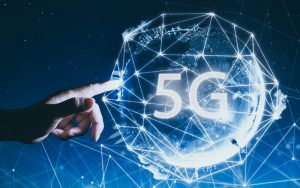The exponentially greater speed and capacity of 5G (fifth generation of cellular tecnology) networks will increase productivity by allowing much more data to be transferred at much greater speeds across greater distances than on previous networks.

What is the big deal about 5G?
To visualize this, 4G wireless infrastructure is a garden hose; 5G would be the St. Rok Tunnel.
5G will enable the growth of new products and industries in areas such as artificial intelligence and interconnected devices in the Internet of Things.
This almost real-time communication is key to enabling smart cities, smart workspaces or smart homes smart factories. It is also important for autonomous driving.

LEGAL ASPECTS OF 5G TECHNOLOGY
5G technology will aid discovery and due diligence
Part of a lawyer’s work is to access troves of data from clients during the discovery stage of a case, and how much data lawyers can analyze, is often limited by how powerful their technology is.
There’s also the matter of doing discovery and due diligence while on the go – some of this work is done in the field, and 5G-enabled devices with incredibly fast download speeds will make it possible for lawyers to be more mobile, thereby helping them perform analytical tasks at a client’s location.
IP & Data privacy
New technology also brings growing trends: intellectual property (IP) litigation and data privacy litigation.
And regarding IP law, everyone is rushing to be 5G-compatible, and as a result, phone manufacturers, laptop companies, and IoT providers will be tempted to use stolen intellectual property.
We will probably see a flood of cases stemming from huge data dumps being carelessly stored in the cloud and hacked or otherwise exposed. This is nothing new, of course but that high-powered data processing is now available to everyone – there will be more incidents in the near future.
5G have the potential to touch virtually every major legal practice area, including banking and finance to mergers and acquisitions, intellectual property, government, labor relations, international trade, and everything in between.
The Internet of Things (IoT), autonomous vehicles, robot doctors, real-time virtual reality, “smart” everything, are only the beginning. Industries such as healthcare, education, media, gaming, manufacturing, transportation, and retail are all poised to assimilate 5G into their processes and workflows.
Liability & Regulatory considerations
Lawyers need not worry: As 5G gains traction, legal assistance will be required to address new liability and regulatory considerations for activities suddenly made possible by 5G. ounsel in order to function properly.
A much-discussed example is the issue of liability when 5G networks allow self-driving cars to communicate with each other and their surroundings.
5G’s impact on M&A
The 5G technology is expected to fuel M&A across a wide range of industries as companies undergo strategic mergers to capitalize on this growth. The impact could be felt in areas as diverse as real estate investment trusts that operate the fiber optics and cell towers in the networks, to industries that can use 5G’s improved machine-to-machine communications for autonomous vehicle operations in remote locations.
Cybersecurity
A 5G network’s capacity to transfer much more wireless data at much faster speeds also creates new security risks of which lawyers and businesses should be aware when structuring deals.
Enabling more devices to be connected to the network means more and higher risks of cybersecurity. The digitalization that comes attached to 5G gives more points of entry and therefore more chances for hackers to find a weak link and access the network. Medical and other private data can be stolen. Interference in IoT communications might lead to hacking of the self-driving vehicles. Identity theft and the spreading of malware are other associated risks.
The cybersecurity risk leads to another legal issue that can also have contractual or other sources: liability. In the event of non-performance of 5G, e.g. if an error of communication occurs during autonomous driving that leads to an accident, more than one entity might be liable, but depending on the circumstances, it might be difficult to determine them.
Conclusion
As we have seen, we are only at the beginning of what 5G can offer in terms of new business opportunities, and at this cutting edge, the need for legal services in areas such as data protection, security and commercial real estate are significant.
The 5G networks will affect a vast array of businesses and operations, given the pre-eminent place of data in modern business and the networks’ increased capacity to generate, transfer and analyze that data.
One thing is certain: 5G will generate a great deal of work for lawyers, legal challenges and legislative actions involving spectrum allocation, licensing, property rights, patent claims, privacy, cybersecurity, health concerns, and other issues.